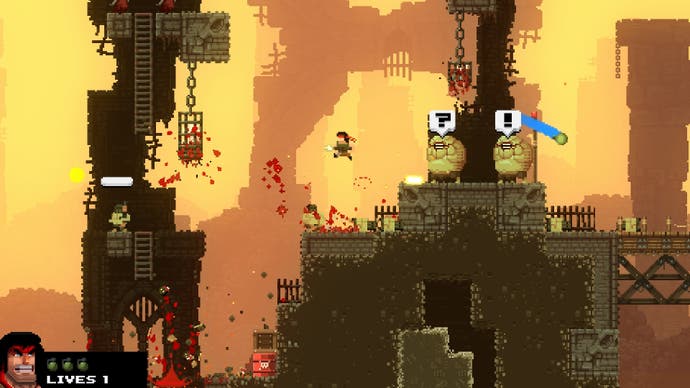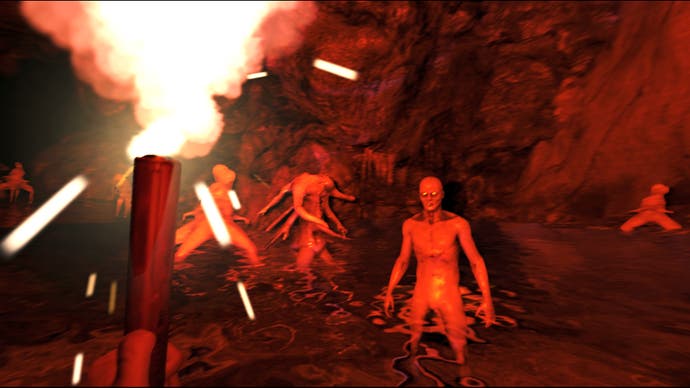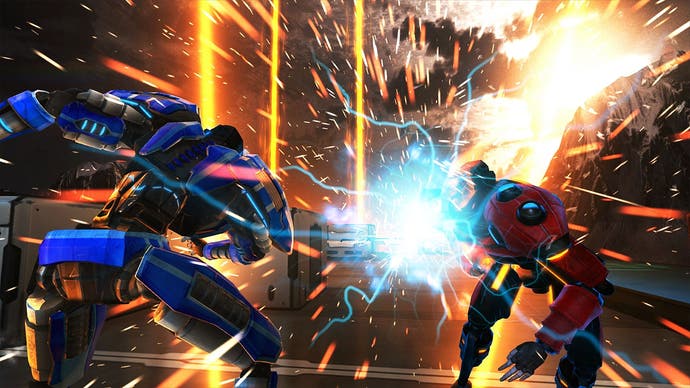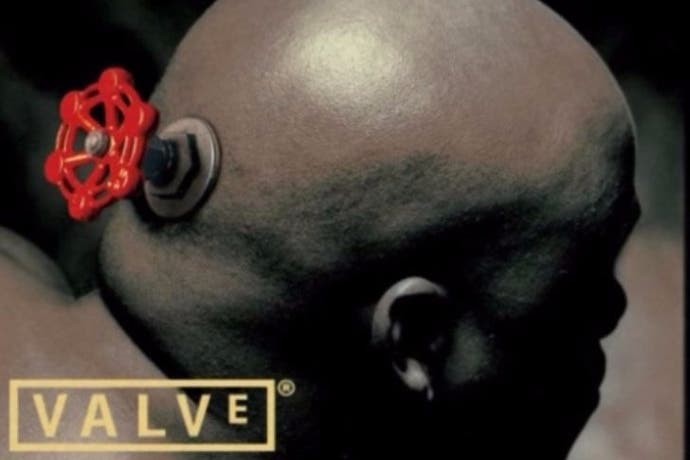Has Steam Greenlight had its day?
Swimming with sharks.
In 2012 Valve launched Greenlight, a corner of Steam where developers could try (with the help of the public, press and anything else they could lay their hands on) and woo Valve into letting them flog their game.
If that sounds kind of ridiculous, it's worth bearing in mind that before Greenlight popped into existence, developers were finding themselves in a bit of a pickle. A number of stores were floundering, the public were increasingly adopting a 'no Steam key, no sale' attitude on the PC and developer's pleas to be allowed onto Steam appeared to be falling on deaf ears. Something needed to change and Greenlight offered up at least a partial solution to some of these woes.
Whilst initially welcomed with open arms, Greenlight never the less got off to a rough start. It launched as a free for all (cue a gazillion Half Life 3 entries, a scenario surely no-one could have seen coming) and within a week, plenty of bans had been issued and a controversial fee instated to try to stave off the worst of it. A couple of months down the line and folks were beginning to question whether it was working well. In under a year it was clear that no, it really wasn't working out so well. Reading back over Valve's ideas for what Greenlight would achieve for developers and for games, they seem faintly naive now.

We're now in our fourth year of Greenlight. It'll be a surprise if it sees a fifth as today Greenlight is mainly a system where a developer pays some money to charity in order to go and hope that Valve will hand them a distribution deal. Everyone else pretty much forgets the entire thing exists. Most folks don't visit the place, the press don't write about it unless something really unusual happens over there and very little unusual happens over there.
In a great deal of ways Greenlight has been working as intended. Thousands of developers have passed through its gates to launch on Steam, thousands of developers have been able to get their games under the noses of people who would have, in a past video game life, never have caught wind of them at all. For plenty of people, the difference between selling on Steam and not selling on Steam is some money coming in as opposed to no money coming in.
For Valve, it's enabled them to make substantial (and mostly effective, despite internet grumbles) changes to the storefront - whilst far, far from perfect, the choice of games is larger, the focus no longer on new releases, discovery (that pesky term we use for 'can people find something they might want to buy') has improved and the spread of money is going to a wider variety of developers. They've been able to change-up stuff under the hood, too, in order to cater to a larger amount of games passing through Steam. On balance, it's doing a lot better, and done a lot more good, than its reputation would have you believe. Of course, in video games, things are never quite so simple.
When setting out to write this piece, I asked a number of developers would they mind talking to me, in confidence, about their experiences with the service and to discuss what it meant to them. I had my own ideas (I've passed a game through the system myself and talked about it often) but I wanted to get a better sense of what being on Greenlight in 2016 was all about. Plenty of folks had reasonably positive experiences on there, some were able to claw some press from it, some found a willing audience for their work on there, a few got through it with barely a hitch. Others found it a chore with a sometimes terrible and abusive audience, talked of having nonsense stats to stare at and how they struggled to claw their way out.

Nearly all the developers I spoke to had absolutely no idea how or why their game got the go ahead to sell on Steam. Whether it took days, weeks, months or years to pass through the system, when they were told their light had turned green it was unfathomable as to why they passed when they did. The majority of folk I talked to felt powerless to influence how and when they would pass and it became a waiting game and little more.
It's this uncertainty that lies at the root of most of Greenlight's problems, an uncertainty as to how, when and if a game can get greenlit. A lot of developers aren't aware many can just bide their time until their game passes, more don't know if they can wait it out when it might well take a year or more. Too many people making games are running on fumes anyway by the time they're closing in on launch, every day their game isn't on the store is a day it's not making money. Every day it's not making money is another day where game development makes for a less viable career choice and doing just about anything else looks smarter.
The bulk of Greenlight's troubles land squarely at the feet of those struggling to get by or get started. The larger name developers skip it or walk right on through with no trouble. A step down from them many find themselves waiting it out but sure to pass one day. The rest are at the mercy of Greenlight's more unscrupulous attendants. Over 2,000 games still sit in Greenlight, each one fodder for the sharks who swim in its waters.
There are "publishers" who don't fulfil any of the roles of actual publishers but take a cut of a developer's sales money all the same. They promise to help get a game through Greenlight but can barely muster more than a tweet about it.
They operate in a way that's a far cry from the more established publishers (or labels as some like to now be known) like Team17, Devolver, Adult Swim and so on, who work closely with developers. Whilst some of these non-publishers are more notorious amongst developers and certain quarters of the press than others, the playbook is pretty similar across the board. Sign a game, if they do anything at all it's to spam a huge contact list with vagaries about the game, sit back as nothing much happens. I've heard this method described as "defying math" by one so-called publisher, as it costs absolutely nothing, aside from a few minutes of emailing, and so any sales/votes made on the back of it are considered a success.
If, through a quirk of fate, a title happens to make it onto the store, the not-publishers price low and then regularly drop the prices further. Through constant deep discounts, the sales numbers go up, but between Valve's cut and a publisher cut, there's little money to be seen at the end of it all. In effect developers are paying people to undervalue their work and to sell their work for next to nothing all in exchange for some hope that they can leave Greenlight soon.

There are giveaway groups who ask for keys once the game has launched in exchange for publicity to help a title pass Greenlight. They'll cheekily ask for cash for publicising a game, too. They have no reach, no contacts, they do nothing even the smallest developer couldn't do themselves for free.
There are terrible contracts, the likes I haven't seen in games since the heady days of dodgy retail publishers.
Around a quarter of games that passed Greenlight have been bundled before making it onto the store. A depressing side effect of no-one paying attention is that slight gestures can move the needle. A few hundred quid earned in exchange for thousands of promised Steam keys can be enough to trigger a pass through the system. It can be tough to make up the cash shortfall once a game's finally launched on the store.
It all goes towards making Greenlight a needlessly treacherous place to start out a game development career. A place where just being on the service sees people bombarded by offers from groups who show little concern for the games or the developers they try and sign. Many explicitly target the newer developers, especially those visibly struggling on the service, knowing that they're more likely to say 'yes'. It's a grim state of affairs and I can't help but feel we owe those starting out a much safer place to do so, the process of getting a video game on a store shouldn't expose anyone to these sort of problems. It shouldn't be so frustrating.
Of course the onus to 'fix' the problems developers face is not and cannot be on Valve alone. There's work to be done to build up alternate marketplaces like itch.io, work to get support structures in place to help new folk learn the pitfalls without falling for them, to help existing developers find more ways to make video games a sustainable business, not a shot in the dark. There's always so much more work to be done and new hurdles to overcome. Yet whilst Greenlight sucks so much oxygen from the room, whilst so many developers find themselves having to battle through it for weeks, months or years and it unfairly disadvantages those new to games, the need to overhaul the system is more urgent than it's ever been.
Over the course of the past four years, Greenlight has helped thousands of games find an audience, but life in video games moves fast. A system built around what's happening in games in 2012 is bound to be beset by problems in 2016. In many ways, we're lucky that Greenlight is managed by a company who want to be better, who want more developers to be able to thrive - I can think of plenty of companies who would have shut it all down and ran by now.
Still, it's time to move on, I think. Greenlight has had its day. It's time for a system that reflects the landscape of making and selling video games in the year of our Molyneux 2016. And if it can help close the doors on those unscrupulous folk who've walked right on in, well, that's even better.









